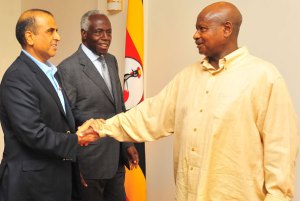Kato Mivule
With Bharti facing fierce competition in Asia, it is no doubt that he is desperate to take a huge chunk of the African I.T market. However, Africans should play hard ball too, for they have leverage and Africa’s Telecom sector is one of the fastest growing and lucrative markets in the world.
Museveni meets telecom investors – Daily Monitor
President Museveni has urged investors to exploit opportunities in the agro-processing industry in Uganda including engaging in the production of fertilizers, phosphates and the steel industry. Mr Museveni was on Tuesday speaking at a meeting with investors from India and Singapore.According a State House press statement, the investors were led by Mr Sinil Bharti Mittal chairman and Group CEO of Bharti Enterprises based in New Delhi, India and Ms Chua Sock Koong, the Group CEO of Singapore Telecommunications limited.
Mr Sunil Bharti Mittal an Indian telecom mogul, is the founder and managing director of Bharti Enterprises.The $7.2 billion turn over company, according to reports, runs India’s largest GSM – based mobile phone service while Singapore Telecommunications Limited (SingTel) is a telecommunications company that provides mobile phone and fixed line telephone operations.
Zain acquisition
Bharti Airtel recently concluded the acquisition of Zain Group’s mobile operations in 15 countries across Africa for an enterprise valuation of $10.7 billion.
The meeting was also attended by Mr James Mulwana, the chairman of the Zain-Uganda board of directors and Mr Yessi Oenga the managing director of Zain Uganda.Details on how Zain Uganda will be affected by Bharti’s takeover are likely to be revealed at a press conference that is slated to be held in Kampala tomorrow.

